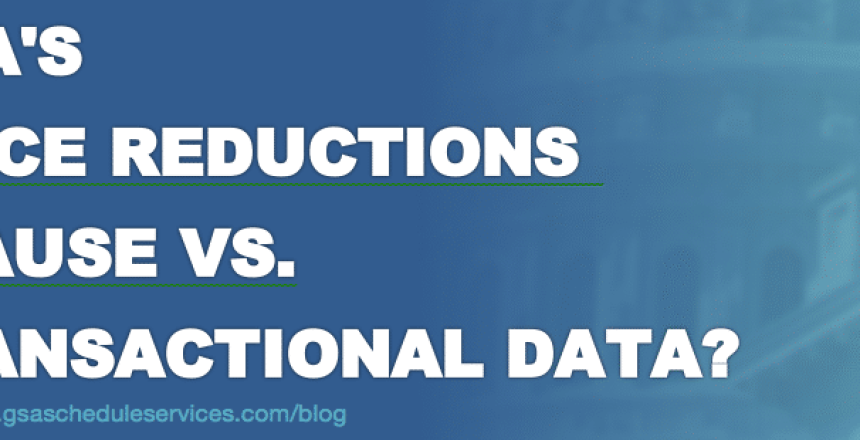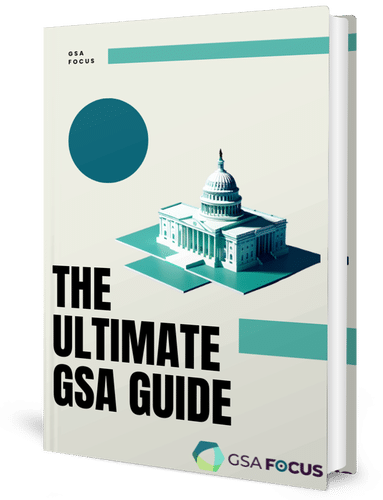If you have been sleeping through 2015, then you may have missed the news that the GSA is considering a removal of the Price Reductions Clause. If you are a GSA Contract holder, then this is probably great news, the PRC has been a thorn in your side for years, right? The question to ask, however, is if the replacement is any better. Reporting Transactional Data would be a large burden on Government Contractors in a very different way.
What Is Happening?
Table of Contents
ToggleThere has been some recent controversy over proposed changes to the Price Reductions Clause (PRC). This clause states the your Basis of Award customer is never to get better prices than those disclosed to GSA. The GSA is proposing replacing the PRC with a Transactional Data Reporting rule. An article from Inside Government Contracts explains the proposed changes well:
… at the heart of the proposed Transactional Data Reporting rule is a shift away from the existing Price Reductions clause to a new framework that relies on the aggregation and analysis of large amounts of transaction-level data to permit horizontal price comparisons across vendors. Under the rule, contractors would be required on a monthly basis to report various elements of transactional data (e.g., unit measure, quantity of item sold, universal product code, prices per unit, etc.). This data would then be sorted and analyzed by expert “category managers,” with the resulting conclusions allowing government buyers — at least in theory — to “easily evaluate the relative competitiveness of prices between FSS vendors.” Significantly, contractors would no longer be subject to the basis of award customer tracking provision of the existing price reductions clause, but they would still be required to submit commercial sales practices (CSP) information when requesting a contract modification.
The Burden of The Price Reductions Clause
Every GSA Contract has a requirement that the agreed-upon Basis of Award (BOA) customer never get a better price than that disclosed to the GSA. This means that if you set your BOA customer to “All Commercial Customers” then you cannot offer any commercial customer a better discount than that disclosed to GSA. And, because your GSA discount is relative to the BOA customer discount, your GSA discount will automatically increase for GSA if you offer a better discount commercially. This is called “triggering” the Price Reductions Clause.
It is complicated, so let me give an example:
- Let’s say the Basis of Award is “All Commercial Customers” and they get a 0% discount.
- The GSA Contract has a 5% discount negotiated.
- If the GSA Contractor sales at a discounted price of 3% to a Commercial Customer, then all future GSA sales are to be at an 8% discount (5% original discount plus the 3% discount given commercially).
This is a huge obstacle to GSA Contract holders. They must always be concerned over how this clause reaches into their commercial sales. Some lose sales, others break the clause and are penalized. Smart Contractors navigate the clause beforehand so at to limit (or eliminate) the damage it can do to their business.
The Burden of The Transactional Data Reporting
As bad a the Price Reductions Clause sounds, the Transactional Data Reporting rule may be worse. We won’t know until it is in practice. But, you can imagine how much effort it will require to keep intricate records on all sales, and reporting it into a GSA system. Imagine being a seller of commodities, with thousands of small transactions every month. It would take a small team to keep record and report the information to the GSA. So, the burden with Transactional Data Reporting is one of extra processes, labor and the associated costs.
In Conclusion
The Price Reductions Clause has been around for decades, and is a well-know evil, but Transactional Data Reporting is new and scary. Everyone agrees that the government must have a system in place to assure that spending budgeted tax dollars is efficient. However, the burden is being heaped upon Government Contractors in heavy loads. And this means that prices to the government are likely to skyrocket under Transactional Data Reporting.
References:
Covington / Inside Government Contracts – Doubts Raised About GSA’s New Vision for Federal Contracting.



